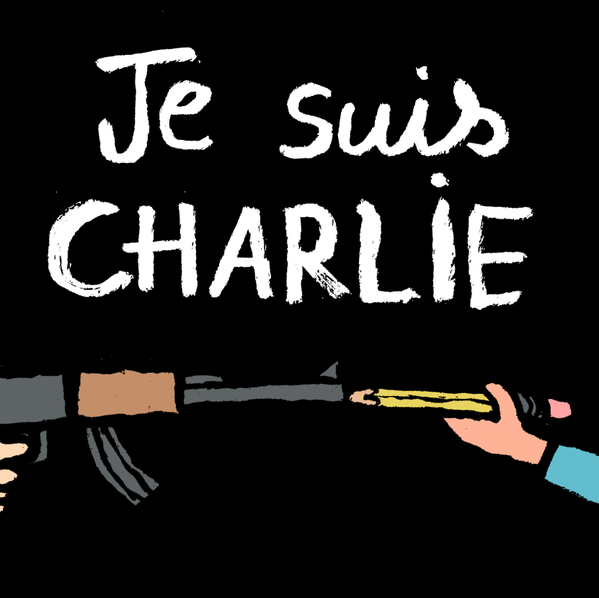“Freedom of speech suggests that you can say whatever you think and that you stand next to your ideas that you defend. The others cannot agree with you but, if what you say doesn’t affect the life of others, you are still free to express yourself.” – Marianne Demarolle, a 12th grader at École Internationale Bilingue
The recent tragic events in Paris sparked a chain of uproarious chants and speeches by both famous politicians and little-known citizens. On January 7th, 2015, editors of the satirical literary magazine Charlie Hebdo were attacked in their office by gunmen out for so-called “revenge.” The assailants claimed that Charlie Hebdo disrespected the Islamic prophet Muhammad in its published cartoons. In a sign of solidarity, world leaders locked arms in Paris soon after to mourn the dead and to express their unity in the fight for freedom of speech. Even with such support, many people have criticized the magazine by saying that they provoked the assailants. To that, I say that they obviously do not understand the situation or context.
I grew up in Paris and agree with those who say France is one of the most racist nations in Europe. It is also home to one of the largest Muslim populations in Europe. Tensions have been rising in France due to growing racial discrimination and the blaming of Muslims for unemployment. On the front lines of this fight against immigrants in general is the Front National, a known anti-immigration, anti-EU political party. The Front National has been called fascist by many, but it is simply extremely right-wing. In the last presidential election, the Front National received 17.9% of the votes, which analysts attributed to people looking for a scapegoat when it comes to unemployment. French unemployment is at 10%, and much of that percentage is made up of young people fresh out of college. This is similar to how in the United States, many blame unemployment on illegal immigrants. People sympathize with the Front National because they are scared and need a job; however, this support also means helping a racist party that wants to evict all foreign residents. This rise in tension between the unemployed French natives and the foreigners (mainly North African Muslims) led to Muslim protests that occurred throughout Paris this summer. Furthermore, this same tension explains why Islamist extremists fought back when their religious leader was publicly mocked by Charlie Hebdo.
I must emphasize that these are extremists. Many people have a misconception that somehow killing innocent lives in the name of Muhammad is what Islam is all about, but they are horribly mistaken and completely uninformed. That is comparable to saying that all Democrats are members of the Green Party. In the same way that we should not persecute Christians for their acts of genocide during the Crusades, we should not persecute Muslims for the acts of extreme jihadists.
French humor is extremely satirical. Charlie Hebdo is a satirical magazine that mirrors the kind of humor that French people enjoy. Similar to South Park, it pokes fun at everyone. There have been issues dedicated to making fun of Islam, Christianity, Judaism, and just about anything imaginable because they are able to find the humor in it. The notion that they provoked an attack by exercising their right to free speech as well as their obligation to continue pleasing the masses is completely absurd. The mocking of Muhammad wasn’t done out of the menace of their hearts but out of the goal to find satire in every ethnicity, race, religion, and so forth. My friend Marianne Demarolle said that “I think that as the journal attacked every institution and people with the same humor and irony, their role was not out of place.” I knew of this magazine growing up in Paris. I used to read it every once in a while, and it is an unspoken truth that nothing inside the magazine is to be taken seriously. Satire and sarcasm are the two pillars of French comedy, and this magazine is a perfect embodiment of it.
As a native and resident of Paris, my friend Lorenzo Micali, an 11th grader at the American School of Paris, said that “the impact was all over the world” and “in the city itself, peaceful manifestations occurred,” meaning that marches for peace were organized and carried out throughout the city. It was very obvious that the city was mourning, but even more obvious that cries for freedom of speech were being heard on a global platform. However, ironically those cries are all talk and no action. “Nothing really was done about it except for speeches around Europe,” said Micali. The politicians took the opportunity to show the world solidarity yet failed to act on it.
Overall context is needed when discussing this tragic event, a knowledge that racial tension is very high in France and that, by nature, the humor is very satirical. When discussing the assailants, know that they are not run-of-the-mill Muslims but extremists who act violently and against the very core of religion they fight for.
“The famous humorists, journalists and drawer who were killed represent the freedom of speech of France. They weren’t afraid to speak and to write their thoughts, ideas. Indeed, the criminals didn’t only eliminate incredible and courageous people who weren’t afraid to stand in front of injustices, but they also killed a state of mind, an idea, and strength. During the days following the events, people were crying because of the event. Even my own parents and friends were crying. Furthermore, people were scared and couldn’t imagine how some people could do such an inhuman act.” – Marianne Demarolle






